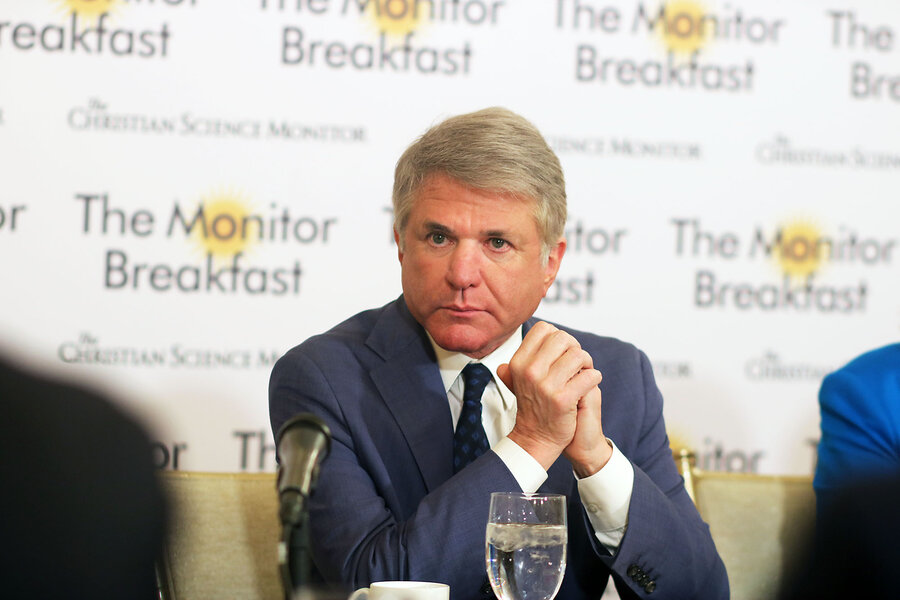GOP’s Michael McCaul sees path to ‘yes’ on House aid for Ukraine
| Washington
Republican congressional supporters of Ukraine – and of getting billions more in U.S. military assistance to the besieged European democracy ASAP – are in a quandary.
How can they heal the divides in the House Republican majority over Ukraine in short order to win a “yes” on $60 billion in fresh Ukraine security assistance that the Senate has already approved? Pressure is growing for the deal to close before Ukraine runs out of the munitions it needs to stave off a freshly advancing Russian army.
“At the end of the day I do think a majority in the House will pass this [Ukraine aid],” Rep. Michael McCaul, chairman of the House Committee on Foreign Affairs, told reporters at a breakfast on Friday, hosted by the Monitor.
While there are some members who “can’t be persuaded,” he says, proponents like himself will have to redouble efforts in the coming days “to make it palatable” enough to win over skeptics and get the aid passed.
That could include revisions to turn the aid package’s economic assistance piece into loans, as well as a stepped-up campaign to educate the American public that as much as 80% of Ukraine’s military assistance actually stays here at home and creates jobs through contracts with the domestic military production industry.
Chairman McCaul’s prediction: One way or another, a Ukraine aid package will pass by April.
A global thinker with a world vision mirroring the “peace through strength” approach of Ronald Reagan, Mr. McCaul says this moment is not unlike the run-up to World War II, with Russian President Vladimir Putin’s war against Ukraine and belligerence toward the Baltic states and other former Soviet republics echoing Adolf Hitler’s swallowing up of much of Europe.
“I have serious concerns about where we are today and the possibility of a major-scale world war like my dad’s generation
[fought],” he says. Russia’s war in Ukraine, he says, is Exhibit A.
“Mr. Putin’s intentions are very clear,” says Mr. McCaul, the representative of Texas’ 10th Congressional District, which stretches from Houston to Austin, since 2005.
Noting his meeting with reporters is taking place against the backdrop of the apparent prison death of Russian opposition figure Alexei Navalny, Mr. McCaul says, “It’s a sad day. I hope out of this death will come something to send a message to the world and to the American people about who Mr. Putin really is.”
Despite that dark picture of where the world stands, Mr. McCaul also sees the moment as presenting opportunities to reassert the kind of strong and inspiring American leadership practiced by President Reagan.
Those opportunities range from Ukraine – where he says American support that allowed Kyiv to win the war would be a defeat not just for Mr. Putin, but for all the world’s “evil dictators” – to Pacific Island nations facing an increasingly aggressive China, and even to the Middle East.
Set to travel to Saudi Arabia next month, Mr. McCaul says a deal on diplomatic recognition between Israel and Saudi Arabia – one that was advancing before the Hamas terrorist attacks and Israel’s war in Gaza – would constitute a “true paradigm shift in the Middle East.” The result would be Arab countries and Israel “aligned against Iran and its proxies.”
Other highlights from the Monitor Breakfast interview:
How do you counter those in your party who say we have to secure our own border before worrying about Ukraine?
There are some [Republicans] I don’t think can be persuaded because the narrative is so strong, the “brainwashing,” if you will, that we have to choose between our southern border and Ukraine. I don’t agree with that. It’s a false dichotomy choice. We’re a great nation; we can do both.
You may be an admirer of Ronald Reagan’s foreign policy, but your party is seeing a resurgence of the isolationism Mr. Reagan opposed. What explains that?
The reason we had isolationism in the late 1930s is because we had World War I. They didn’t want to die in a European war again. We have a very young membership in the Congress now. A lot of them never even lived through the Cold War. What they do have a personal experience with are these “forever wars” [of] Iraq and Afghanistan. They don’t want us to get pulled into another ... “foreign entanglement.” The [Biden] administration has failed to explain why this [assistance to Ukraine] is in our national security interest.
Donald Trump is making known his opposition to further aid for Ukraine. Does winning the fight for additional assistance require getting a nod from the former president?
He’s got a lot of control over my party. There’s no question about it. ... [But] he was the first president to put lethal aid into Ukraine. ... You can’t forget that. He’s probably thinking about, “Do I want to be the guy who comes in to fix the problem, or was I the guy who ... advocated for its implosion?”
Iran is one factor, but why else do you say the stakes are so high in the effort to secure a diplomatic agreement between Israel and Saudi Arabia?
The first phase [of a Saudi deal] would be a security agreement with the United States, which would involve weapons sales. I would prefer to sign off on that rather than have them buy that from China. ... I would rather win over the Arab nations to the United States’ side, rather than China’s influence and Russia’s. If we don’t do this, there’s a lot at stake.
Would you consider serving in a second Trump administration, say as secretary of state, secretary of homeland security, or director of the CIA?
The track record’s been interesting with former Cabinet members [at which point a chuckle ensues from Mr. McCaul]. I’d have to have a serious conversation to make sure I could advance my world vision.






